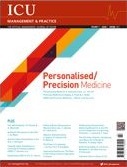Volume 17 - Issue 1, 2017
- ICU
- 16/03/2017
Change content default value
READ MORE
The specialty of intensive care medicine grew out of the realisation that critically ill patients needed more attention and specialised treatment than could be provided on a general ward, and that many of these patients had similar clinical problems and processes, so management would be facilitated if they were grouped together in one place. Since...
READ MOREMultiple failed clinical trials testing immunomodulatory therapies for sepsis argue for a new approach. While precision medicine has been successfully implemented in other fields, testing it in sepsis poses challenges, which this review will discuss, along with potential implementation strategies. Sepsis has an estimated annual incidence of 1.3...
READ MOREWhat is the path forward for treatment of acute respiratory distress syndrome (ARDS)? Is it big trials (favoured by clinical scientists) or further insight into disease physiopathology (favoured by basic scientists)? Or both? Funding resources are limited and the debate is wide open. In the post-genomic era, a new direction is needed. On 20 January 2015,...
READ MOREMultidrug resistance (MDR) is increasing worldwide and has been acknowledged as one of the major threats to healthcare by the World Economic Forum and the World Health Organization (World Health Organization 2014). Intensive care unit (ICU) patients seem to be particularly susceptible for acquiring MDR organisms, either just as colonisers, or as pathogens...
READ MORESerum albumin is an essential plasma protein, with a variety of homeostatic and predictive roles in health and disease (Figure 1) . Hypoalbuminaemia is common in critical illness. Human albumin solution has been administered clinically for more than five decades, but its use has been subject to marked controversy for the last twenty years (Fanali...
READ MOREDarryl O’Callaghan and Julie Vermeir are survivors of a road trauma that happened in 2010. Their article provides insight into their journey as patient and wife, and the lessons that can be learnt. Darryl’s Story There are many courageous souls who have lost their lives attempting to climb Mt Everest. Those who attempt such a climb arrive...
READ MOREWhat is human factors? How would you explain to a hospital director why they should hire human factors specialists? Human Factors (HF) is the study of how people interact physically and psychologically with their environment—this includes the products, tools, procedures and processes they interact with. HF professionals use insights...
READ MOREAdvancing Research in the Intensive Care Unit via the Integration of a Nursing Professor Advances in healthcare and management strategies for the critically ill patient continue to evolve at a rate that can become challenging for individual clinicians to keep abreast. It is crucial that medical, nursing and allied health professionals use an evidence-based...
READ MOREPeter Pronovost, MD, PhD, FCCM, is Director, Armstrong Institute for Patient Safety and Quality, Senior Vice President, Patient Safety and Quality and Professor of Anesthesiology and Critical Care Medicine at Johns Hopkins Medicine in Baltimore, Maryland, USA. Dr. Pronovost is a leading authority on patient safety and developed a scientifically...
READ MORE